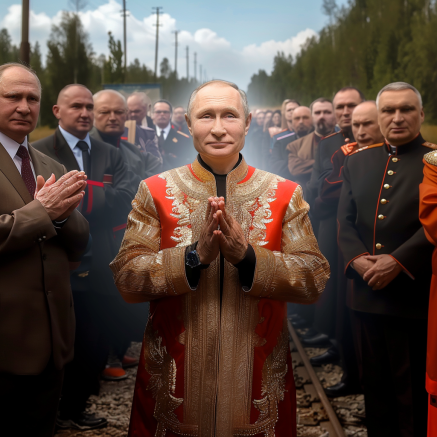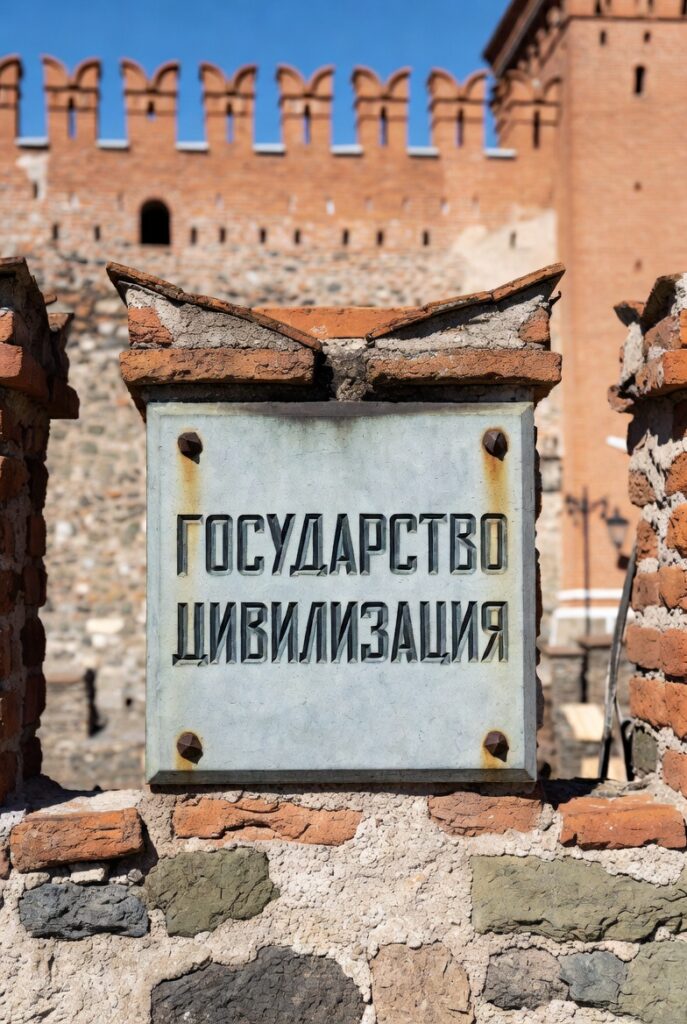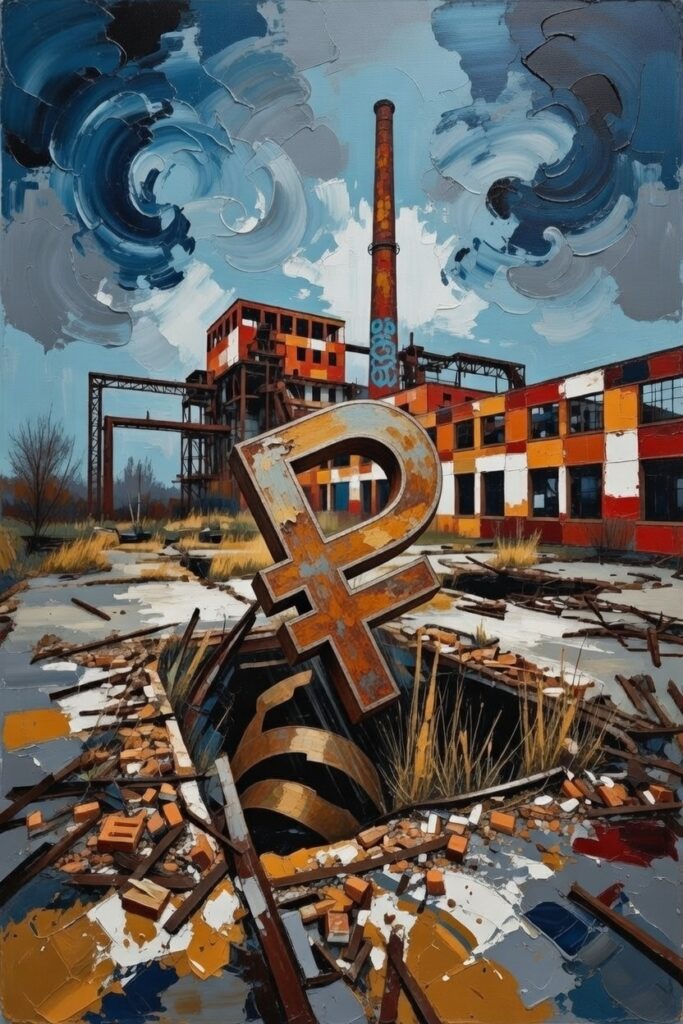Last week, Vladimir Putin took part in the unveiling of several major infrastructure and industrial facilities: highways in the Tver and Samara regions and new workshops at metallurgical plants in the Nizhny Novgorod and Chelyabinsk regions and the annexed so-called «Donetsk People’s Republic.» The opening ceremonies of new roads, factories, large hospitals and schools with the participation of the president have become an important ritual for the Kremlin. This ritual is meant to impress both the country’s inhabitants and Putin himself. Ordinary Russians are supposed to interpret these ceremonies as a sign that the country’s economy is alive up and running, that the sanctions are not working, and that the war goes on as usual, somewhere far away from their lives. Triumphant reports about industrial achievements and new gigantic construction projects were one of the main elements of Soviet television propaganda: viewers regularly learned how much grain farmers had threshed, which factories had opened new workshops in people’s industry, and where. In the new version of this propaganda, however, the central figure is not the builders, workers and peasants, but Putin. They ask him for permission to start the production line, and he nods approvingly. This presidential permission is an important part of the opening ceremony. Russians should realize that everything in the country moves, runs, works and is being built only thanks to the higher will of the president, thanks to his approving nod. Putin himself also likes to see the country’s achievements of his «era». Thus, the «Rossiya» Exhibition and Forum that was built to the president’s liking, worked longer than it should have and was turned into a permanently functioning center. Putin visited it several times and brought foreign guests there.
The most experienced and cunning officials have learned to exploit this weakness of Putin’s. Deputy Prime Minister for Construction Marat Khusnullin has long been one of the president’s favorite event managers. At opening ceremonies, he regularly thanks Putin and emphasizes his special role in the construction of each facility. The opening of roads in the Tver and Samara regions was no exception: the deputy prime minister traditionally thanked the president and spoke about his special role in the projects. The young Industry Minister, Anton Alikhanov, a protégé of the Rostec clan, has been quick to learn from the older courtiers. He, too, praises and thanks the president. Yet it is important to remember that at a certain point, Soviet citizens became skeptical of the propaganda that fed them triumphant reports about record milk yields and industrial successes: what good were these reports if they had little or no impact on their daily lives The impact of «presidential optimism» on Russian citizens is also limited: the opening ceremonies take place somewhere out there, and only occasionally have any effect on people’s daily lives and well-being. The ubiquitous Putin, without whom roads are not built and businesses do not operate, can quickly become tiresome, and the ceremonies themselves are increasingly viewed with irony by the public. Soviet leaders did not abuse such events, but ditties mocking their supposedly decisive role in all the country’s achievements were an ever-evolving genre of oral popular tradition.
Crimean replacements
For a long time Sergey Tsekov and Olga Kovitidi represented the annexed Crimea in the Russian Federation Council. Now the regional authorities have decided to replace them with the ultra-patriotic chess player Sergey Karjakin and Yuri Nimchenko, a military officer and participant in the invasion of Ukraine (he’s been awarded the highest order of the Hero of Russia). Both Tsekov and Kovitidi are representatives of local elites and public politicians in the truest sense of the word. Both can be described as passionate and ardent supporters of Ukrainian territories «joining Russia.» Until 2014, Sergey Tsekov held posts in the Crimean parliament and headed the Russian community in Crimea, while Olga Kovitidi was a Crimean deputy from Viktor Yanukovych’s Party of Regions. In the Federation Council, Tsekov and Kovitidi came up with outrageous initiatives. Tsekov proposed banning citizens of military age from leaving Russia, confiscating property from those who have left the country, transferring ambulance workers from vans to motorcycles, and uniting Crimea with Sevastopol (the annexed city has the status of a separate region). Kovitidi argued that the list of diseases that give deferment from the army should be reduced, and criticized men who attend gyms and fitness centers. These initiatives never materialized, were not coordinated with the Kremlin and unnerved it a lot, as news of bans proposed by the «senators» disturbed the public. Tsekov’s idea to unite Sevastopol and Crimea was strongly rejected by both the city’s residents and its elites. Both Olga Kovitidi and Sergey Tsekov behaved like public politicians and both were loose cannons. At the same time, the presidential administration could not take the risk of demoting these active participants of the Russian Spring, while the Crimean authorities kept Tsekov and Kovitidi in the Federation Council in order to appear more moderate and reasonable in contrast to these two.
More than ten years have passed since the annexation of Crimea, and the Kremlin has finally decided to replace the controversial parliamentarians. Both Kariakin and Nymchenko have formal ties to the peninsula and meet the residency requirement (necessary because neither holds a position that would allow them to bypass it). They do not fit into local power arrangements and the center views them largely as symbolic figures. Sergey Kariakin publicly supports the war and the Russian government, giving talks at its public events. Nimchenko is a participant in Russia’s war against Ukraine, and his promotion to senator is meant to signal that war veterans do indeed have a chance to become the «new elite» (although such examples are few and far between). However, it is symptomatic that a «special» rather than an average Russian region is used here to nominate an «ultra-patriotic» athlete and military man. On the one hand, Russia’s influential regional politicians receive a signal that the center is not yet in the mood to promote high-placed «ultra-patriots» through their «ordinary» territories and is replacing some «ultra-patriots» with others. On the other hand, the Kremlin has clearly begun to exercise pressure on the Crimean authorities, who have thus far enjoyed their autonomy, and promote figures who are not «Varangians» (politicians hand-picked by Moscow to govern or represent the regions that they have no personal connections to), but who do not fit into the power dynamics of the elite groups. It is likely that the expansion of the federal authorities into the region, where the local elites still enjoy considerable autonomy, will continue.
A patriot arrested
The siloviki have arrested the former head of the Cultural Department of the Moscow Mayor’s office, Alexander Kibovsky. He had recently been working as an adviser to the Mayor’s Office, overseeing the Mayor’s interaction with the annexed territories. In 2015, Kibovsky replaced Sergei Kapkov, who as head of the culture department oversaw Moscow’s urban transformation of well-kept parks, festivals, concerts, etc., and produced a specific phenomenon of expensive infrastructure developments and cultural initiatives that has been summed up in a popular saying: «Moscow has become so much prettier with Sobyanin as Mayor!» With Kapkov’s departure and the appointment of Kibovsky, the Cultural Department’s policy became more conservative. In 2022, Alexander Kibovsky supported Russia’s full-scale invasion of Ukraine and publicly declaimed Konstantin Simonov’s 1942 poem «Kill Him!» («If your house means a thing to you/Where you first dreamed your Russian dreams/In your swinging cradle, afloat/Beneath the log ceiling beams <… If you don’t want a German to tread/The floor in your house and chance/To sit in your ancestors’ place/And destroy your yard’s trees and plants… <…> So kill at least one of them/And as soon as you can./Still Each one you chance to see!/Kill him! Kill him! Kill! «). The «he» and «they» in the original poem written during WWII referred to German Nazis, but its contemporary allusions in Kibovsky’s interpretation are all too clear. At the time, Moscow Mayor Sergey Sobyanin did his best to avoid publicly expressing support for the war.
Kibovsky’s arrest suggests that the military-patriotic indulgence for Russian officials is about to expire. The siloviki have returned to their usual modus operandi and are trying to meet their KPIs in fighting corruption and organizing anti-corruption trials. Even the most ardent support for the war has become the norm and a common place, and does not in any way exclude officials and politicians from the general ranks, gives them no special immunity and guarantees no preferential treatment.










